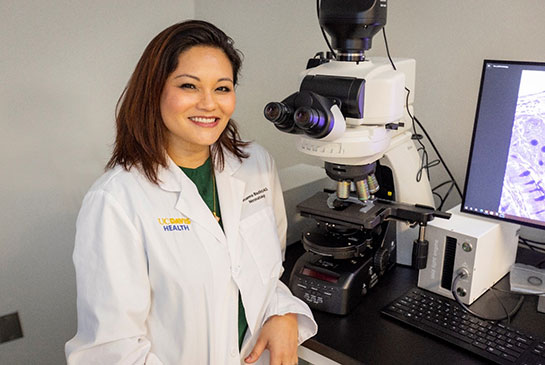Neonatal-Perinatal Medicine Research
-
Geoanna Marie Bautista, M.D.
Link to Geoanna Bautista bioarrow_forwardGeoanna Bautista’s research is focused on impaired gut motility and intestinal adaptation in the setting of prematurity and surgical diseases affecting the small and large intestine of the neonate. She is particularly interested in the role of mechanosensitive cation channel, Piezo1, in gut maturation and regulation of intestinal processes in specific gastrointestinal pathologies affecting the neonate. Geoanna Bautista uses a basic/translational approach with conditional and inducible knock-out mouse models and human tissue correlates. Clinical interests include intestinal injury in the extreme premature population, including NEC and SIP, and surgical diseases affecting the neonate including but not limited to short gut syndrome, gastroschisis, intestinal atresias and related disorders.
Publications:
-
Nicole Cacho, M.D.
Link to Nicole Cacho bioarrow_forwardNicole Cacho's research focuses on the provision of human milk for critically ill and premature infants. Nicole Cacho conducts research to investigate the protective components in both mother's own milk and donor human milk.
Publications:
-
Kara Kuhn-Riordon, M.D.
Link to Kara Kuhn-Riordon bioarrow_forwardKara Riordon is a neonatologist with interest in improving the care of critically ill neonates using technology.
Publications:
-
Satyan Lakshminrusimha, M.D., M.B.B.S.
Link to Satyan Lakshminrusimha bioarrow_forwardSatyan Lakshminrusimha’s research interests are focused on pulmonary transition at birth and disorders of pulmonary transition such as birth asphyxia and persistent pulmonary hypertension of the newborn. His current work on optimal oxygenation in neonatal lung injury evaluates ideal concentrations of inspired oxygen to maintain optimal delivery of oxygen to the brain. He is involved in coming up with novel neonatal resuscitation techniques to enhance return of spontaneous circulation and minimizing brain injury. In addition, he is the principal investigator of a multicenter clinical trial evaluating the role of milrinone in congenital diaphragmatic hernia in the NICHD Neonatal Research Network.
Publications:
-
Steven James McElroy, M.D.
Link to Steven McElroy bioarrow_forwardSteven McElroy is involved in both basic and clinical research involving injury and repair mechanisms of the developing small intestine. He is specifically interested in how these processes relate to neonatal necrotizing enterocolitis. Steven McElroy’s laboratory has made seminal discoveries linking Paneth cells and goblet cells to protection of the immature intestinal tract, has developed novel mouse models of necrotizing enterocolitis, and has begun to investigate the link between maternal chorioamnionitis and subsequent intestinal disease of offspring. Clinical interests include neonatal growth and nutrition, intestinal injury including NEC and SIP, and care of ELBW infants with a focus on those at the limits of viability.
Research Laboratory:
Publications:
-
Shoshana Newman-Lindsay, M.D.
Link to Shoshana Newman-Lindsayarrow_forwardShoshana Newman-Lindsay's scholarly work includes the use of simulation for medical education and improving resuscitations. She also is active in quality improvement, including implementing Less Invasive Surfactant Administration and care for the smallest babies.
Publications:
-
Francis Poulain, M.D.
Link to Francis Poulain bioarrow_forwardFrancis Poulain research interests revolve around developing better understanding the pathogenesis and prevention of lung diseases of the newborn. After years spent developing animal models of surfactant protein deficiency, Francis Poulain is now mostly involved in the conduct of multicenter clinical trials testing new therapeutic ideas directed at preventing complications of prematurity. In addition, through the University of California fetal Consortium, Francis Poulain is participating in studies of infants with gastroschisis to help develop better therapeutic pathways.
Publications:
-
Catherine Anne-Marie Rottkamp, M.D., Ph.D.
Link to Catherine Rottkamp bioarrow_forwardCatherine Rottkamp’s research includes; neurodevelopmental and behavioral outcomes for premature, critically ill infants and other at-risk newborns in the NICU.
Publications:
-
Deepika Sankaran, M.D., F.A.A.P.
Link to Deepika Sankaran bioarrow_forwardDeepika Sankaran’s laboratory research focuses on neonatal resuscitation including chest compressions, epinephrine and use of oxygen during and after resuscitation in an ovine model. Her research on flush volume following umbilical venous epinephrine dose influenced the change in national neonatal resuscitation guidelines in 2021. Her goal is to improve outcomes in all newborn infants, and especially preterm and term infants who require resuscitation at birth. She is currently evaluating the role of early rapid volume resuscitation in neonatal hypovolemic cardiac arrest. Her clinical research interests include cardiovascular effects of prenatal methamphetamine exposure in the newborns, short-term neonatal outcomes after perinatal syphilis infection and prevention of congenital syphilis, and neonatal non-invasive carbon dioxide monitoring.
Publications:
-
Yogen Singh, M.D., M.A. (Cantab), F.A.S.E., F.R.C.P.C.H.
Link to Yogen Singh bioarrow_forwardYogen Singh's research focuses on cardiovascular physiology, especially neonatal and pediatric hemodynamics and pulmonary hypertension. He is a well known expert on Targeted Neonatal Echocardiography (TNE) and point-of-care ultrasound (POCUS), and utilizes these skills to advance research in neonatal hemodynamics and to improve patient outcomes.
Publications:
-
Christina Anna Sollinger, M.D.
Link to Christina Sollinger bioarrow_forwardNeonatal quality and safety projects/outcomes, care of surgical neonates, and medical education.
Publications:
-
Emily Stieren, M.D., Ph.D.
Link to Emily Stieren bioarrow_forwardEmily Stieren’s research interests include identifying early predictors of neurocognitive disorders and optimizing neurodevelopmental outcomes for premature infants and newborns with critical illness.
Publications:
-
Payam Vali, M.D.
Link to Payam Vali bioarrow_forwardPayam Vali’s research Interests include neonatal resuscitation and persistent pulmonary hypertension of the newborn (clinical as well as research in a lamb model).
Publications:














